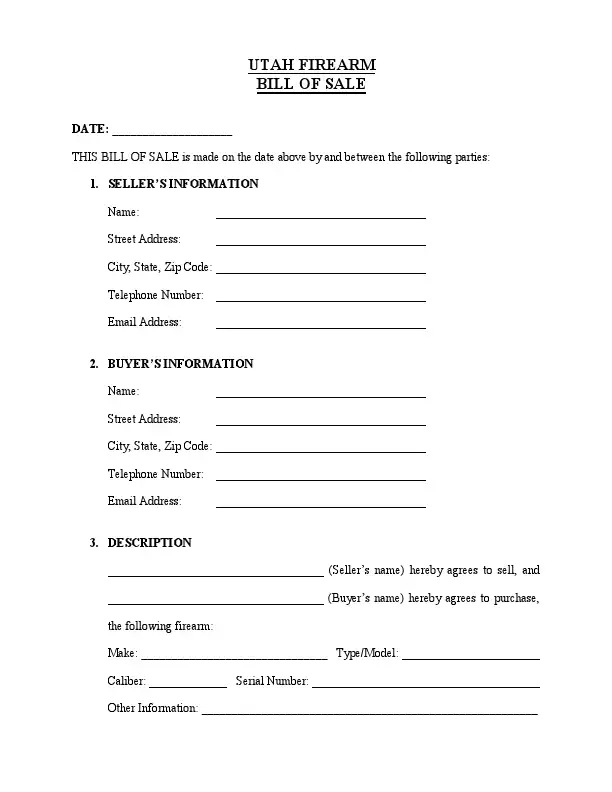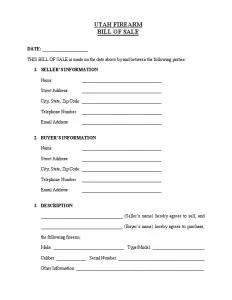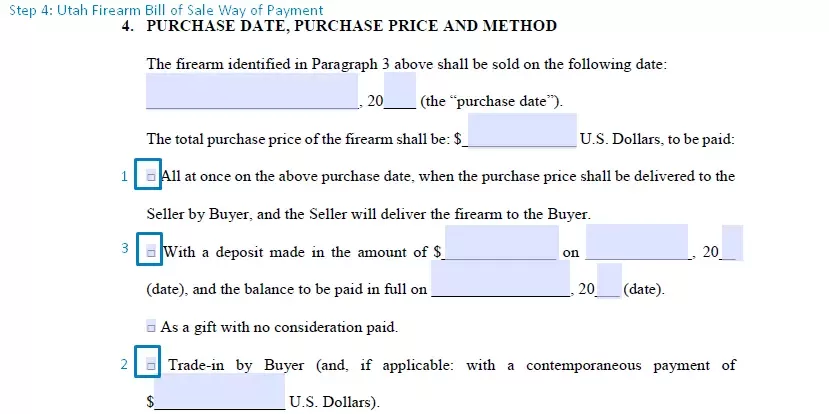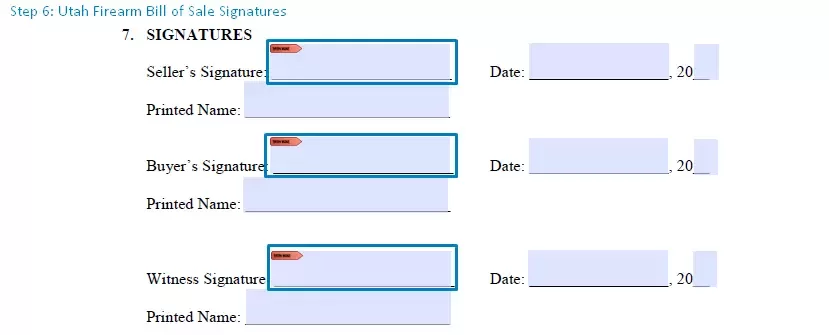Utah Firearm Bill of Sale Form
The Utah firearm bill of sale is a legal document serving as official evidence of a private sale of a gun between two Utah residents. It serves as substantial proof of the gun’s chain of ownership, indicating the personal identification data of the seller and buyer, the gun’s model and characteristics, as well as its actual sale price for the moment of the transaction. The completed free bill of sale has to be notarized.
Utah bill of sale forms – visit for more Utah-related bill of sale templates that you may need.
Before filling in any bill of sale form, make sure you know everything about the specifics of this document. Our guide will be of help – https://formspal.com/bill-of-sale/.

Build Your Document
Answer a few simple questions to make your document in minutes
Save and Print
Save progress and finish on any device, download and print anytime
Sign and Use
Your valid, lawyer-approved document is ready
Registering a Gun in Utah
The gun laws of Utah are democratic, allowing all citizens to acquire, store, and carry firearms. Under Utah legislation, an individual should not file an official application for a firearm permit to buy a gun. Thus, a bill of sale completed between the seller and buyer serves as their mutual guarantee and a track record of firearm’s change of ownership.
Gun dealers and shops specializing in firearm sales have to seek the Public Safety Bureau of Criminal Identification (BCI) approval for the operation. These dealers also need to conduct a background check for every buyer coming to obtain a firearm from them. The background check fee is charged from the buyer, equaling $7.50.
Because no specialized documentation package is required for registering a gun in Utah, the buyer and seller need to complete the Utah firearm bill of sale correctly to have their transaction notarized and legally recorded. The bill of sale should include:
- The proof of buyer’s eligibility for firearm purchase in the territory of Utah (absence of the history of a criminal conviction, drug abuse, dishonorable dismissal from the Armed Forces, renunciation of citizenship, mental illness, etc.)
- Details about the firearm (make, model, caliber, S/N, and cost)
- Details about the buyer and seller (name, address, DL, CWL, and contact number)
- Sale conditions and date
- Buyer’s and seller’s signatures
The buyer signing the bill of sale automatically agrees to get the item in the “as-is” state with no warranty suggested by the seller. The sale of a firearm also suggests its precautionary inspection at a qualified gunsmith to verify its working order and avoid any traumas and damages. After the bill of sale is signed, any damage caused by the sold firearm is beyond the seller’s scope of responsibility.
Though there is no special firearm legislation in Utah, all buyers and sellers should comply with the Federal Law statutes suggesting that a firearm transaction may take place only between two residents of Utah. A gun owner from Utah thus can’t sell a gun to a resident of another state, even if there are lax gun laws as well. Private gun transfers via a local FFL are allowed since March 2013 in Utah, with no waiting periods for the background checks.
Utah Firearm Purchase Details
| Subject | Long Guns | Hand Guns |
| Registration of a Firearm | Not required | Not required |
| Permit to Purchase | Not required | Not required |
| Concealed Weapons Permit Fee | $53.25 for residents and $63.25 for non-residents | |
| Background Check for Private Sales | Not required | Not required |
| Persons Prohibited from Carrying Firearms | Utah Code, Section 76-10-503 | |

How to Write Utah Firearm Bill of Sale
The filling recommendations were written for the bill of sale form created by our team. We highly suggest using the local official version when possible.
Step 1: Specify the date when the document is created.

Step 2: Enter the seller’s and buyer’s information:
- Full name
- Street
- City of residence
- State of residence
- Zipcode
- Phone
- Email address

Step 3: Type in the descriptive details of the firearm:
- Manufacturer
- Type/Model
- Caliber
- Serial Number
- Other information you deem crucial.

Step 4: At this point, you will need to specify the way in which you are going to be given money for the offer.
Type in the sale date and specify the full amount that must be paid for the firearm. After that’s been performed, you will need to check the way of transaction:
- The entire amount straight away. One of the more simple methods: within the same day, the purchaser has the firearm delivered to them and transfers the whole amount of money.
- Trade-in. In the event that this option is selected, the selling party trades their firearm for the firearm presented by the purchaser. If the buyer’s firearm is lower in value, they will have to even that out with an extra payment. The purchaser’s firearm description must also be contained in the document.
- In installments. With this particular method, you need to enter the dates when the purchaser has to deliver the initial and the final payments, together with their amounts.
Next, choose one payment method:
- Cash
- Cheque
- Cashier’s check
- Money order
The final thing to complete in this particular section would be to choose if all applicable taxes are included in the final cost.

Step 5: Look at disclosures and miscellaneous terms.
Both parties must agree with essential disclosures by placing their signatures below each list respectively. The “as-is” part states that the firearm owner provides no warranties and is not responsible for repairs after the transfer.

Step 6: Now, the filled-out form has to be signed.
The buyer is usually not requested to sign the bill of sale. However, you’ll be more protected from legal issues if both sides sign the form. As an additional precaution, it is possible to have one or two people witness the process and sign the form.

Step 7: Use the services of a notary public
Although notarization is rarely required, it serves as one more way to guard against legal problems. If you want to get more tips on using a firearm bill of sale properly, use our guide – https://formspal.com/bill-of-sale/firearm-bill-of-sale/.
The purchaser should own the original bill of sale as it’s commonly necessary during the title change. As a seller, you may either make a copy and store it or have a pair of identical forms signed and completed by both parties.
